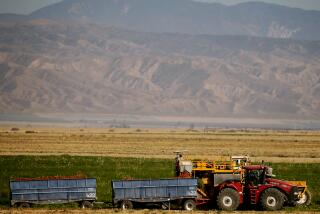Water Wars, Water Wars, Everywhere
- Share via
SACRAMENTO — It was just a few years ago that peace was said to be breaking out in California’s infamous water wars. A series of truces had been negotiated to assure an acceptable supply of water for farmers and fishes and fledgling communities alike. Historic was the preferred adjective for such breakthroughs as the so-called Miller-Bradley bill and Bay-Delta accord.
While publicly celebrated, the prospect of quiet on the water front must have created unease among water warriors. The wars have long provided full-time employment for many lawyers, political fixers, farm representatives, policy researchers and environmental crusaders. Happily for them, the rumors of peace were just that: Rumors.
Water wars are now raging everywhere. Legal briefs and poison-pen memorandums volley across the state. Not even the rains of El Nino can calm the combatants. On the San Joaquin Valley’s westside, for one example, farming interests have gone to court to challenge the Miller-Bradley truce, contending that too much water will be allocated for environmental purposes. Environmentalists counter that too much water will go to the farmers.
Trading of captured water through an open market also has provoked nasty skirmishes, fights over who should be allowed to sell taxpayer-subsidized water, who should be allowed to buy, what can be fairly charged to transport it, and on and on. “Same as ever,” one veteran water warrior observed the other day, feigning weariness.
*
Much of the action is obtuse, requiring a 60-hour-a-week water policy habit to grasp the nuances. Suffering no such addiction, your correspondent cannot claim membership in the Hydraulic Brotherhood. Still, even with a distant eye, it is possible to make out the fundamental conflict: There simply is not enough water to go around to meet the competing demands--as opposed to needs--of California water consumers.
In these matters, a fix on the roster of warring parties can prove elusive: They no longer seem to march as one anymore. Farmers who want water to keep farming are pitted against farmers who want water to sell to cities. Still another faction fights to maintain its water allocations, but mainly as a means to sell the farm: Without access to water, much of California’s farm acreage would be worthless.
Among environmentalists are those who want to deal with agriculture and the water establishment, who have demanded and gained a seat at the negotiating table. They catch heat from more jaded brethren who argue that, while the shape of the table has been debated, corporate farmers have continued to amass fortunes with subsidized water, dry up rivers and foul aquifers. A third environmental column wants to prop up farmers, even if it takes guarantees of more water, as a buffer against the march of suburbs.
Urban water districts and the business community, finally, shift alliances with ease, first siding with the environmentalists, then courting farmers, then reversing field again. Internally they debate whether to keep faith with water marketing, or instead push for a return to the good old days of building more reservoirs and dams. The idea of resurrecting the infamous Peripheral Canal even has been floated, mainly in coded whispers about a need for “dual conveyances” and “isolated facilities.”
*
Most of this fighting takes place below the radar of public attention. Following the best scientific models, it can be safely predicted here that 87.9% of the readership abandoned this column in the first paragraph--as soon as the topic became clear. This will not be taken personally. It typically takes severe drought, or flood, or an environmental outrage like the Kesterson bird kill, to generate much general interest in water. Playing politically to the North-South rivalry, manipulated to great effect two decades ago in the Peripheral Canal debate, also can broaden the audience.
And yet, watched or ignored, the wars will persist. That California tamed its waters is one of the state’s great fables, routinely exposed in both flood and drought. That it could tame its water politics also would appear to be a fictitious notion, no matter how well intentioned. If anything, the fighting will grow even more contentious as the cities sprawl deeper into farmland and the pressure on natural resources mounts.
“Go get the water,” a westside pioneer once advised his kin, “and the land will come to you.” Water is money. Water is power. Water is the variable element in the competing dreams of so many Californians--those who would build cotton baronies in the desert, stucco cities on the plains; those who would let the throttled rivers run free again. In short, water simply is too important not to go to war over. And so they do. And so they always will.
More to Read
Sign up for Essential California
The most important California stories and recommendations in your inbox every morning.
You may occasionally receive promotional content from the Los Angeles Times.










